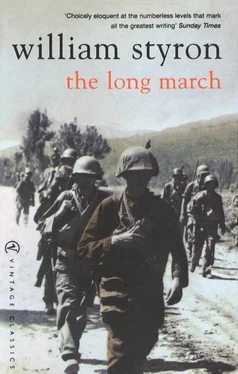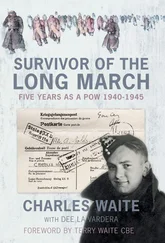William Styron - The Long March
Здесь есть возможность читать онлайн «William Styron - The Long March» весь текст электронной книги совершенно бесплатно (целиком полную версию без сокращений). В некоторых случаях можно слушать аудио, скачать через торрент в формате fb2 и присутствует краткое содержание. Город: New York, Год выпуска: 1952, ISBN: 1952, Издательство: Vintage Classics, Жанр: prose_military, на английском языке. Описание произведения, (предисловие) а так же отзывы посетителей доступны на портале библиотеки ЛибКат.
- Название:The Long March
- Автор:
- Издательство:Vintage Classics
- Жанр:
- Год:1952
- Город:New York
- ISBN:978-0099422792
- Рейтинг книги:3 / 5. Голосов: 1
-
Избранное:Добавить в избранное
- Отзывы:
-
Ваша оценка:
- 60
- 1
- 2
- 3
- 4
- 5
The Long March: краткое содержание, описание и аннотация
Предлагаем к чтению аннотацию, описание, краткое содержание или предисловие (зависит от того, что написал сам автор книги «The Long March»). Если вы не нашли необходимую информацию о книге — напишите в комментариях, мы постараемся отыскать её.
The Long March — читать онлайн бесплатно полную книгу (весь текст) целиком
Ниже представлен текст книги, разбитый по страницам. Система сохранения места последней прочитанной страницы, позволяет с удобством читать онлайн бесплатно книгу «The Long March», без необходимости каждый раз заново искать на чём Вы остановились. Поставьте закладку, и сможете в любой момент перейти на страницу, на которой закончили чтение.
Интервал:
Закладка:
“Well,” he said, “maybe you’d better ride in on one of the trucks.”
If there had been ever the faintest possibility that Mannix would ride in, those words shattered it. Mannix drew his foot away abruptly, as if the Colonel’s hand were acid, or fire. “No, sir!” he said fiercely—too fiercely, the note of antagonism, now, was unmistakable— “No, sir! I’ll make this frigging march.” Furiously, he began to put on his shoe. The Colonel rose to his feet, hooked his thumbs in his belt and gazed carelessly down.
“I think you’re going to regret it,” he said, “with that foot of yours.”
The Captain got up, limping off toward his company, over his retreating shoulder shot back a short, clipped burst of words at the Colonel—whose eyeballs rolled white with astonishment when he heard them— and thereby joined the battle.
“Who cares what you think,” he said.
IV
Had the Colonel entertained any immediate notions of retribution, he held them off, for at a quarter past four that morning—halfway through the march, when the first green light of dawn streaked the sky—Culver still heard Mannix’s hoarse, ill-tempered voice, lashing his troops from the rear. For hours he had lost track of Mannix. As for the Colonel, the word had spread that he was no longer pacing the march but had gone somewhere to the rear and was walking there. In his misery, a wave of hope swelled up in Culver: if the Colonel had become fagged, and was walking no longer but sitting in his jeep somewhere, at least they’d all have the consolation of having succeeded while their leader failed. But it was a hope, Culver knew, that was ill-founded. He’d be back there slogging away. The bastard could outmarch twenty men, twenty raging Mannixes.
The hike had become disorganized, no slower but simply more spread out. Culver— held back by fatigue and thirst and the burning, enlarging pain in his feet—found himself straggling behind. From time to time he managed to catch up; at one point he discovered himself at the tail end of Man-nix’s company, but he no longer really cared. The night had simply become a great solitude of pain and thirst, and an exhaustion so profound that it enveloped his whole spirit, and precluded thought.
A truck rumbled past, loaded with supine marines, so still they appeared unconscious. Another passed, and another—they came all night. But far to the front, long after each truck’s passage, he could hear Mannix’s cry: “Keep on, Jack! This company’s walking in.” They pushed on through the night, a shambling horde of zombies in drenched dungarees, eyes transfixed on the earth in a sort of glazed, avid concentration. After midnight it seemed to Culver that his mind only registered impressions, and these impressions had no sequence but were projected upon his brain in a scattered, disordered riot, like a movie film pieced together by an idiot. His memory went back no further than the day before; he no longer thought of anything so unattainable as home. Even the end of the march seemed a fanciful thing, beyond all possibility, and what small aspirations he now had were only to endure this one hour, if just to attain the microscopic bliss of ten minutes’ rest and a mouthful of warm water. And bordering his memory was ever the violent and haunting picture of the mangled bodies he had seen—when? where? it seemed weeks, years ago, beneath the light of an almost prehistoric sun; try as he could, to dwell upon consoling scenes—home, music, sleep—his mind was balked beyond that vision: the shattered youth with slumbering eyes, the blood, the swarming noon.
Then at the next halt, their sixth—or seventh, eighth, Culver had long ago lost count —he saw Mannix lying beside a jeep-towed water-cart at the rear of his company. O’Leary was sprawled out next to him, breath coming in long asthmatic groans. Culver eased himself painfully down beside them and touched Mannix’s arm. The light of dawn, a feverish pale green, had begun to appear, outlining on Mannix’s face a twisted look of suffering. His eyes were closed.
“How you doing, Al?” Culver said, reaching up to refill his canteen.
“Hotsy-totsy,” he breathed, “except for my frigging foot. How you making it, boy?” His voice was listless. Culver looked down at Mannix’s shoe; he had taken it off, to expose heel and sock, where, soaked up like the wick of a lantern, rose a dark streak of blood.
“Jesus,” Culver said, “Al, for Christ sake now, you’d better ride in on a truck.”
“Nail’s out, sport. I finally stole me a pair of pliers, some radioman. Had to run like hell to catch up.”
“Even so—” Culver began. But Mannix had fallen into an impervious silence. Up the road stretched a line of squatting men, Mannix’s company. Most were sprawled in the weeds or the dust of the road in attitudes as stiff as death, yet some nearby sat slumped over their rifles, drinking water, smoking; there was a thin resentful muttering in the air. And the men close at hand—the faces he could see in the indecisive light—wore looks of agonized and silent protest. They seemed to be mutely seeking for the Captain, author of their misery, and they were like faces of men in bondage who had jettisoned all hope, and were close to defeat. In the weeds Mannix breathed heavily, mingling his with the tortured wheezes of O’Leary, who had fallen sound asleep. It was getting hot again. No one spoke. Then a fitful rumbling filled the dawn, grew louder, and along the line bodies stirred, heads turned, gazing eastward down the road at an oncoming, roaring cloud of dust. Out of the dust came a machine. It was a truck, and it passed them, and it rattled to a stop up in the midst of the company.
“Anyone crapped out here?” a voice called. “I got room for ten more.”
There was a movement toward the truck; nearby, half a dozen men got to their feet, slung their rifles, and began to hobble up the road. Culver watched them tensely, hearing Mannix stir beside him, putting his shoe back on. O’Leary had awakened and sat up. Together the three of them watched the procession toward the truck: a straggle of limping men plodding as wretchedly as dog-pound animals toward that yawning vehicle in the smoky dawn, huge, green, and possessed of wheels—which would deliver them to freedom, to sleep, oblivion. Mannix watched them without expression, through inflamed eyes; he seemed so drugged, so dumb with exhaustion, that he was unaware of what was taking place. “What happened to the Colonel?” he said absently.
“He went off in a jeep a couple of hours ago,” O’Leary said, “said something about checking on the column of march.”
“What?” Mannix said. Again, he seemed unaware of the words, as if they—like the sight of this slow streaming exodus toward the truck—were making no sudden imprint on his mind, but were filtering into his consciousness through piles and layers of wool. A dozen more men arose and began a lame procession toward the truck. Mannix watched them, blinking. “What?” he repeated.
“To check the column, sir,” O’Leary repeated. “That’s what he said.”
“He did?” Mannix turned with an angry, questioning look. “Who’s pacing the march, then?”
“Major Lawrence is.”
“He is?” Mannix rose to his feet, precariously, stiffly and in pain balancing himself not on the heel, but the toe only, of his wounded foot. He blinked in the dawn, gazing at the rear of the truck and the cluster of marines there, feebly lifting themselves into the interior. He said nothing and Culver, watching him from below, could only think of the baffled fury of some great bear cornered, bloody and torn by a foe whose tactics were no braver than his own, but simply more cunning. He bit his lips—out of pain perhaps, but as likely out of impotent rage and frustration, and he seemed close to tears when he said, in a tone almost like grief: “ He crapped out! He crapped out!”
Читать дальшеИнтервал:
Закладка:
Похожие книги на «The Long March»
Представляем Вашему вниманию похожие книги на «The Long March» списком для выбора. Мы отобрали схожую по названию и смыслу литературу в надежде предоставить читателям больше вариантов отыскать новые, интересные, ещё непрочитанные произведения.
Обсуждение, отзывы о книге «The Long March» и просто собственные мнения читателей. Оставьте ваши комментарии, напишите, что Вы думаете о произведении, его смысле или главных героях. Укажите что конкретно понравилось, а что нет, и почему Вы так считаете.






![Джеффри Арчер - The Short, the Long and the Tall [С иллюстрациями]](/books/388600/dzheffri-archer-the-short-the-long-and-the-tall-s-thumb.webp)





